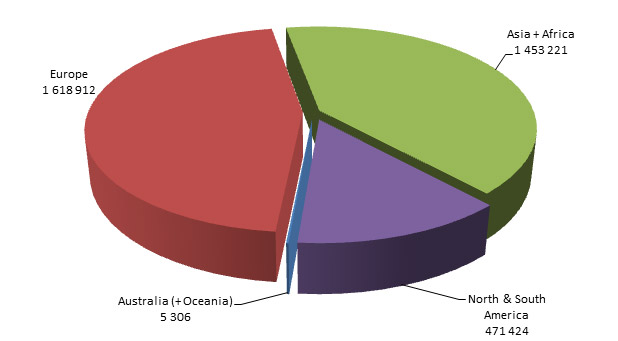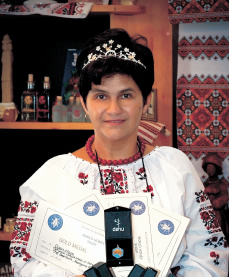Ukraine in Brief
Location – in Eastern Europe, incorporates Crimea Autonomous Republic.
Area – 603,628 km2
Population – 45,888 (January 2010)
Time zone – EET (UTC+2
Summer time zone – EEST (UTC+3)
Internet TLD – .ua
Calling code – +380
Capital – Kyiv (2,8 million inhabitants).
Other big cities – Kharkiv (1, 68 million), Dnepropetrovsk (1,23 million), Donetsk (1,15 million), Odesa (1,12 million), Lviv (800 thousand).
Official language – Ukrainian
Dominant religion – Christianity (Orthodox, Greek-Catholic)
Currency – Hryvnia =100 kopiykas ( € 1.00 – 10.27 UAH, $ 1.00 – 7.99 UAHm – May 2012)
Independence: since 24 August 1991
Area
- Total area – 603 628 km2
- Water area (%) – 7 %
Population
- Total – 45,888 (January 2010)
- Density – 77/km2 (115th)
Government: Unitary semi-presidential republic
- President – Viktor Yanukovych
- Prime Minister – Mykola Azarov
- Speaker of the Parliament – Volodymyr Lytvyn
Politics.
Ukraine is independent country under a mixed semi-parliamentary semi-presidential system with separate legislative, executive, and judicial branches. The country has a constitution. The head of state is a President of Ukraine elected by the direct popular vote by Ukrainian citizens who are 18 years and over. The highest legislative body of Ukraine is unicameral parliament – Verkhovna Rada. The highest executive body of Ukraine is the Cabinet of Ministers.
Climate
Ukraine has a mostly temperate continental climate, although a more Mediterranean climate is found on the southern Crimean coast.
Economy of Ukraine
Ukraine is a country with developed scientific and industrial base, a member of the World Trade Organization (from May 16, 2008). National economy includes such industries as heavy machinery, ferrous and nonferrous metallurgy, shipbuilding, production of buses, cars, trucks, tractors and other agricultural equipment, locomotives, machine tools, turbines, aircraft engines and aircraft equipment for power stations, oil and chemical industry and others. In addition, Ukraine is a powerful producer of electricity. Some sectors of economy of Ukraine are developing with high quality technologies. On a good level are put the production of carrier rockets, satellites and equipment for space exploration. Ukraine is a major manufacturer of military equipment – tanks, military transport aircraft, anti-aircraft missile systems, optical equipment.
| Date | Day |
|---|
| January 1 | New Year’s Day |
| January 7 | Orthodox Christmas |
| March 8 | International Women’s Day
|
| May 1 & 2 | Labour Days
|
| May 9 | Victory Day |
| June 28 | Constitution Day |
| August 24 | Independence Day |
| Variable date | Orthodox Easter |
| Variable date | Holy Trinity Day (Triytsya) |
Did you know that…
….Ukraine is the largest country located fully within Europe?
….geographically, Ukraine is located in Central Eastern Europe?
…..Ukraine is the fifth-ranked country in Europe (after Germany, Italy, United Kingdom, and France) and the 21st in the world population-wise? Ukraine is the home to 7.3% of the population of Europe and 1% of the world population?
……in Western Ukraine between the cities Uzhhorod and Rakhiv stands a historical marker ‘Geographical centre of Europe’? The status of this place was fixed at the congress of geographers in Vienna back in the XIX century, which became the first scientific attempt in the world to determine the centre of the European continent?
….four of ten European transport corridors are running thorough Ukrainian territory?
…..Ukraine has more than a quarter of all fertile black earth in the world?
…..the longest river in Ukraine is Dnipro? Out of its total length of 2201 km, 981 km is running thorough Ukraine. Dnipro is the third river in Europe in terms of the length and basin area (after Volga and Danube). Its source is the Aksenninsky Turf Swamp in the southern part of the Valdai Hills, and the river empties into Dniprovsky Estuary of the Black Sea. 65% of the total area of Dnipro basin is located within Ukraine?
….the longest cave is Ukraine is called ‘Optimistic’ and located in gypsum rocks of Podillya, Ternopil Oblast? In that cave the scientists have found and mapped 216 kilometers of passages, galleries, and grottos located 20 meters deep, which makes the Optimistic Cave the longest cave in the Old World, the longest cave in the world in gypsum rock, and the second-longest cave in the world (behind limestone Mammoth Cave in the USA). Next to it, and also in Ternopil Oblast, is the second-longest cave in Ukraine called Ozerna: its labyrinth is 114 km long.
…..Five Ukrainian sites representing outstanding cultural and natural landmarks and constituting historical and cultural assets of the entire mankind were included to the list of UNESCO World Heritage:
- Kiev – Saint-Sophia Cathedra
- Kiev – Related Monastic Buildings, Kiev-Pechersk Lavra
- L’viv – the Ensemble of the Historic Centre
- Struve Geodetic Arc
- Primeval Beech Forests of the Carpathians
… Ukraine is a large grain producers (belonging to the top three of the largest barley producer). Along with France, Germany, and the USA, Ukraine is one of the largest producers of sugar beet, ahead of the neighboring Poland and Turkey. Ukraine is one of the seven largest producers of sugar, vegetable oil, pork, and potato in the world, and the fifth-largest honey producer in the world?
… Ukraine spends US 590 million annually on its defense? Ukraine is the only country in the world which had voluntarily given up the nuclear weapons, and although the Hollywood producers like to show in their films the terrorists stealing nuclear bomb from Ukraine, it’s simply not true.
…..Ukraine is the 4th-ranked country in the world in terms of the number of citizens with higher education? Ukrainian population is one of the most educated in the world, and the per capita number of people with higher education is higher than the average European index.
… Ukraine has 5 sectoral state academies: Ukrainian Academy of Agrarian Sciences, Academy of Medical Sciences, Academy of Pedagogical Sciences, Academy of Legal Sciences, and Academy of Arts?
… The majority of Ukrainian population (about 70 %) speaks Ukrainian language? It differs substantially from Russian. Our language is more beautiful and melodious. Ukrainian language is considered the third lovely-sounding language in the world after the French and Japanese languages, and the World Conference of Linguists held in Rome in the middle of the 1920’s recognized Ukrainian the second-melodious language in the world after Italian. Ukrainian language belongs to the most widely used languages in the world and is ranked 26th in terms of the number of speakers. It is also the second most-spoken among the Slavic languages after Russian. About 31 million people in Ukraine can speak Ukrainian. About 4.1 million Ukrainians living in the Russian Federation speak Ukrainian language.
… The person to whom the most number of monuments was erected in the world is our Taras Shevchenko, a genial Ukrainian poet, artist, and thinker?
… First kerosene lamp was invented in 1853 in Lviv by pharmacists Ihnatiy Lukasevych and Jan Zech who worked in the pharmacy ‘Under the Golden Star’? The same year, the first surgery was performed in a Lviv hospital under the light of a kerosene lamp. Soon, kerosene lamp was exhibited at the international fair in Munich where the invention was awarded a special diploma?
….The first frame hive was invented in 1814 by PI Prokopovych
… In the 1950’s the first computer in continental Europe was built by S. Lebedev, and the digital automata theory was developed by V. Glushkov, based on which new-generation computers were created in Ukraine (‘Ukraine’, МІР)?
… The 1920s – 1940s witnessed creation of the largest charged particle accelerator in Europe, development and implementation of the theory of welding under the layer of flux (by Y. Paton)?
… Trembita used by Hutsuls in the Ukrainian Carpathians is the longest wind musical instrument in the world?


